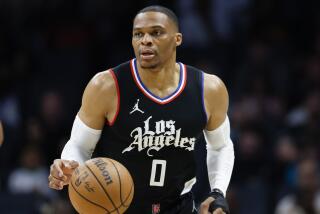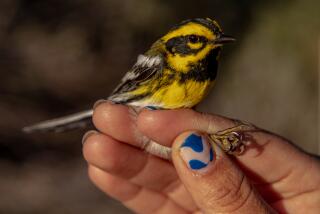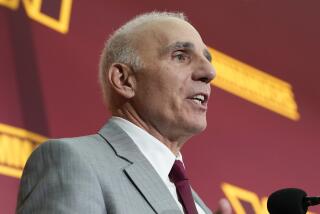COMMENTARY : It’s a Shame This Game Is in the Name : Nicknames: Why should native Americans accept that we don’t mean anything bad by them? Why should they have to be more understanding than the rest of us?
Off in the distance the wheels of change are grinding. You may not be able to hear them yet. But it’s only a matter of time until “Redskins” is gone.
I’ve grown accustomed to it over the years--and fond of it, I have to admit. I loved the old helmet, the one with the feather. I certainly never thought of myself as a racist for caring about the “Redskins.” I never thought of the name as anything but harmless, something protected by antiquity.
That’s because I never really thought about it.
It’s not an animal name, like the Chicago Bears, or a weather name, like the Phoenix Suns, or homage to a city’s history, like the Pittsburgh Steelers.
Oh sure, we don’t mean anything offensive by it. But what kind of excuse is that? You’ve heard this before, but how well would the name Blackskins play here? Why should the native Americans accept that we don’t mean anything bad by it? Why should they have to be more understanding than the rest of us?
In rebuttal, you might point out that excessive sensitivity might actually lead to intolerance. Would you ban “Huckleberry Finn” because the word . . . (perjorative for black)? Would you ban “The Merchant Of Venice” because of the stereotypical characterization of the Jewish Shylock? Might we not be going overboard here with political correctness?
In rebuttal, you might also point out that there are names which are solely based on ethnicity, like Notre Dame’s Fighting Irish and the Vancouver Canucks, and those people aren’t upset. But those people chose the nicknames. As far as I know, George Preston Marshall didn’t poll any Indians before he announced the name 58 years ago in Boston. That’s right, Boston! It wasn’t even our name to begin with, so let’s not hear about how it’s a Washington tradition.
Carl Shaw, director of public affairs for the Bureau of Indian Affairs, and a Cherokee himself, said, “Indians often say, ‘We are people. We aren’t mascots.’ ” Surely we can agree there are egregious offenses on the mascot level, and begin redressing them by halting the insulting caricatures, like the warpaint, the feather headdresses--most of all the vile Tomahawk Chop. Maybe I’m being naive, but I don’t see why Indians would be offended by names like Chiefs and Braves, which are analagous to Generals and Soldiers, names that appear to appreciate their strength and achievement.
But Redskins?
“I don’t know where you draw the line on this, whether you include Chiefs and Braves,” Shaw said. “But without a doubt, ever since the term ‘Redskin’ was created by the white man, it was a very derogatory, offensive term. . . . You might ask, Why didn’t anybody say anything about this years ago? The Indians are a very small voice. Finally, they’re being heard.”
The genie is out of the bottle on this issue. In Washington, D.C., the home of the Redskins, the mayor and eight members of the city council have expressed their opinions that the name should be changed--a rather unexpected position for elected officials to take, especially just after a Super Bowl win.
Elsewhere, colleges and universities like Dartmouth, Stanford and Eastern Michigan jettisoned names like “Indians” and “Hurons.” Last week the St. John’s Redmen introduced a new mascot, a playful Sesame Street beastie. Portland’s respected newspaper, The Oregonian, has a new editorial policy not to publish certain nicknames of pro teams, believing they perpetuate racial and cultural stereotypes. In The Oregonian you will read about “the football team in Washington.”
The “Redskin” question makes me uncomfortable. I wrote five months worth of Bandwagon columns and avoided it. I don’t sense any groundswell out there to change the name, and I suspect most people would rather the issue go away. You might think there’s a liberal-conservative split. But good liberals I admire think the whole thing is silly.
“It’s just a football team,” one told me in exasperation. “There are far worse examples of racial insensitivity in the world. This is not going to solve discrimination. The fans associate ‘Redskins’ with something positive.”
The problem is, apparently many Indians don’t see it that way. Shaw talked about mascots portrayed as savages, in paint and feathers on the warpath, and said, “What does an Indian father say to his kids when they ask, ‘Daddy, is that how you used to do it?’ ”
There’s a glib tendency to trivialize this issue by stretching it absurdly, and suggesting if these names are changed, Animal Rights advocates will demand that names like Dolphins and Tigers be changed, and then religious leaders will demand the varied forms of Devils be changed because they glorify Satanism, and atheists will demand that Padres and Angels be changed, and populists will want Kings and Royals changed, and of course Brewers must go, as it encourages drunk driving, etc.
Oh please.
The issue is whether it’s proper to have a team name that derives solely from skin color.
It’s interesting that of all the nicknames the players have given themselves--Posse, Hogs, National Defense, Fun Bunch--none ever had anything to do with warpaint, warpath or scalping, or any other racial and cultural Indian stereotypes. I’d like to keep the name Skins. Maybe make it Pigskins to play off Hogs. That way we could save the song. I love that song.
Hogs at the feed trough Fight for old D.C. Look, names are changed, and institutions survive. Stanford goes on as The Cardinal. The Colt .45s became the Astros. If we had to preserve everything as it started, the Dodgers would be in Brooklyn.
Some think that the only reason to change “Redskins” is to bend at the vogue knee of being Politically Correct.
I think it will eventually be done simply to be correct. Period.
More to Read
Go beyond the scoreboard
Get the latest on L.A.'s teams in the daily Sports Report newsletter.
You may occasionally receive promotional content from the Los Angeles Times.










